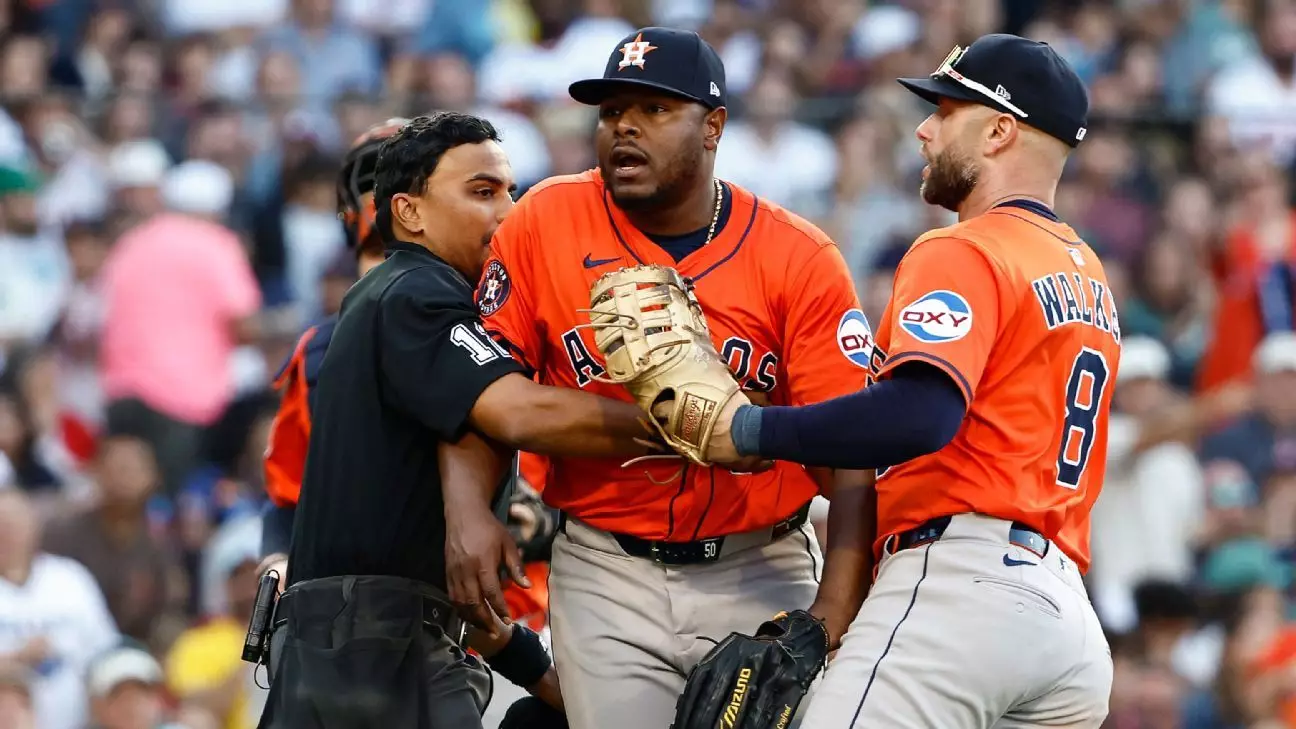In a recent high-stakes game between the Houston Astros and the Boston Red Sox, the atmosphere was charged with tension, culminating in a heated exchange that momentarily disrupted the flow of play. Astros reliever Hector Neris’s decision to use a balk to advance a runner, followed by an altercation with Red Sox third base coach Kyle Hudson, underscored the fragility of composure in competitive sports. Such incidents do more than just momentarily shift focus—they expose the deeper emotional undercurrents that players and coaches carry into every game. Neris’s act of balking, a move that might seem minor to some, carries significant psychological weight, often reflecting internal frustrations or strategic gambits designed to disrupt the opponent’s rhythm.
What’s more intriguing is Neris’s candid admission that he considered the possibility of sign-stealing by the opposition. His ambiguous response—”Maybe yes, maybe no”—mirrors a broader skepticism that has plagued the sport since the 2017 and 2018 sign-stealing scandals. The act of blinking into suspicion throws a shadow over the game’s integrity, forcing both players and fans to question what constitutes fair play. This incident serves as a stark reminder that beneath the thrill of competition lies a battleground of trust, deception, and sometimes, outright misconduct.
The Underlying Issue: Sign-Stealing and Its Lingering Fallout
The controversy isn’t just about one balk or a heated word exchange; it underscores a deeper, systemic issue within Major League Baseball. The Astros’ notorious history with electronic sign-stealing has cast a shadow over their accomplishments and player reputations. Although MLB disciplined the team, the scandal left scars—doubts about the legitimacy of their success and suspicion that the playing field may not have been level.
The current tense environment raises urgent questions about the efficacy of MLB’s technological safeguards. Despite the widespread adoption of PitchCom—an electronic system designed to relay pitches securely—players and coaches remain wary. The possibility that runners on second bases can decipher signs by observing grips or setups hints that the game’s technology might not always be enough to deter clandestine tactics. This persistent vulnerability fuels the fire of mistrust, making conflicts like the recent dustup more than just isolated incidents—they become symbols of ongoing struggles to uphold the game’s integrity.
The Human Element: Emotions, Perceptions, and the Fairness of Competition
Baseball is as much a psychological contest as it is a physical one. The players, coaches, and officials operate under immense pressure to perform within a framework of unwritten rules and sportsmanship. When suspicions of sign-stealing arise, these perceptions can ignite tempers and lead to confrontations that ripple beyond the field.
Neris’s remarks about wanting to “concentrate” and his vague comments about the confrontation reflect a mixture of frustration, defensiveness, and perhaps guilt. His refusal to clarify what transpired suggests an understanding that words can escalate tensions; yet, it also raises questions about transparency. Such moments expose how individuals grapple with their sense of fairness and reputation amid suspicion. The quick gathering of teams and officials to restore order is a testament to the game’s resilience—an attempt to supervise control over unpredictable human reactions.
Furthermore, the role of leadership becomes crucial in these instances. Red Sox manager Alex Cora’s deflection of questions regarding sign-stealing highlights the delicate political landscape of MLB. Cora’s history with the Astros’ scandal adds another layer of complexity, given his past involvement and subsequent suspension. His presence in the managerial seat now exemplifies a nuanced battle between accountability and the desire to protect team loyalty, adding an intriguing dimension to the ongoing discourse about ethics and trust in baseball.
By scrutinizing this incident through a critical lens, it becomes clear that public perceptions of fairness are increasingly fragile. The game’s technological advancements have not eradicated suspicion; instead, they have shifted the battleground into a murky realm where trust must be actively cultivated. Ultimately, moments like these serve as stark reminders that integrity in sports is a fragile achievement—one that requires constant vigilance, transparency, and commitment from all stakeholders involved.

